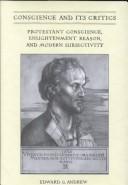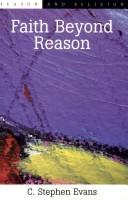| Listing 1 - 10 of 69 | << page >> |
Sort by
|
Book
ISBN: 0830866426 9780830866427 9780830852529 Year: 2019 Publisher: Downers Grove
Abstract | Keywords | Export | Availability | Bookmark
 Loading...
Loading...Choose an application
- Reference Manager
- EndNote
- RefWorks (Direct export to RefWorks)
Book
ISBN: 1622730755 1622730577 9781622730759 9781622730575 Year: 2016 Publisher: Wilmington, Delaware Vernon Press
Abstract | Keywords | Export | Availability | Bookmark
 Loading...
Loading...Choose an application
- Reference Manager
- EndNote
- RefWorks (Direct export to RefWorks)
The purpose of the book is to examine the theological claims of ethics, faith and belief from a philosophical perspective. The Abrahamic and Mosaic covenants of the Old Testament, Jesus of the synoptic gospels, and Paul's writings serve as the frame of reference in examining a biblical expression of reason and structured logic. The message of Jesus centered on the Kingdom of God, defined the meaning of faith and belief, established a new ethic, and framed the message in logic forms. The life and death of Jesus brought the realization of God's final covenant as prophesied by the Old Testament. However, Paul appropriated and developed the Jesus of history into the mythological eschatological Christ figure. The clash of philosophy and theology is evident with theological presuppositions that are based on spiritual insight and divine revelation. Logic in scripture employs propositions based primarily on revealed proof that is within the context of that which cannot be proven absolutely. Uncovering the identity of YHWH in the manuscripts and religious practices of Canaanite culture clearly associated YHWH with the polytheism of the Ugarit texts. YHWH was one of the seventy sons of the Canaanite Most High God El and took on a unique identity that was rooted in El and the polytheistic nature of the pantheon of gods. Theological truths stand within the context of faith and reason stands apart from faith and infers only that which can be proven based on evidence. That which is knowable by faith cannot be known by reason since reason cannot validate that which is not proven to exist.

ISBN: 1442614870 1282033875 9786612033872 1442673249 9781442673243 9781282033870 0802048595 9780802048592 9781442614871 6612033878 1442654309 Year: 2000 Publisher: Toronto
Abstract | Keywords | Export | Availability | Bookmark
 Loading...
Loading...Choose an application
- Reference Manager
- EndNote
- RefWorks (Direct export to RefWorks)
Conscience and Its Critics is an eloquent and passionate examination of the opposition between Protestant conscience and Enlightenment reason in the seventeenth and eighteenth centuries. Seeking to illuminate what the United Nations Declaration of Rights means in its assertion that reason and conscience are the definitive qualities of human beings, Edward Andrew attempts to give determinate shape to the protean notion of conscience through historical analysis. The argument turns on the liberal Enlightenment's attempt to deconstruct conscience as an innate practical principle. The ontological basis for individualism in the seventeenth century, conscience was replaced in the eighteenth century by public opinion and conformity to social expectations. Focusing on the English tradition of political thought and moral psychology and drawing on a wide range of writers, Andrew reveals a strongly conservative dimension to the Enlightenment in opposing the egalitarian and antinomian strain in Protestant conscience. He then traces the unresolved relationship between reason and conscience through to the modern conception of the liberty of conscience, and shows how conscience served to contest social inequality and the natural laws of capitalist accumulation.
Conscience --- Faith and reason --- Religious aspects --- Christianity.

ISBN: 0585159092 9780585159096 0748607943 Year: 2022 Publisher: Edinburgh
Abstract | Keywords | Export | Availability | Bookmark
 Loading...
Loading...Choose an application
- Reference Manager
- EndNote
- RefWorks (Direct export to RefWorks)
Can a 'leap' of faith be justified? Ought we not to reject anything for which there is no evidence? C. Stephen Evans distinguishes between a faith which rejects all reason and a faith requiring that reason is self-critical. In this accessible book he addresses this central debate in the philosophy of religion in the light of the key arguments from Kierkegaard, Aquinas and Kant. The text leads the student gently through the traditional topics, such as knowledge of God's existence, the problem of evil, and how someone could know that his or her religion had been based on revelation from God.
Book
ISBN: 1438436157 1441687130 9781441687135 9781438436159 9781438436135 1438436130 Year: 2011 Publisher: Albany State University of New York Press
Abstract | Keywords | Export | Availability | Bookmark
 Loading...
Loading...Choose an application
- Reference Manager
- EndNote
- RefWorks (Direct export to RefWorks)
Few words are as widely misconceived as the word "faith." Faith is often set in stark opposition to reason, considered antithetical to scientific thought, and heavily identified with religion. Donald Crosby's revealing book provides a more complex picture, discussing faith and its connection to the whole of human life and human knowledge. Crosby writes about that existential faith that underlies, shapes, and supports a person's life and its sense of purpose and direction. Such faith does not make a person religious and being secular does not mean one rejects all forms of faith. Throughout the book Crosby makes the case that faith is fundamentally involved in all processes of reasoning and that reason is an essential part of all dependable forms of faith.Crosby elaborates the major components of faith and goes on to look at the mutually dependent relationships between faith and knowledge, faith and scientific knowledge, and faith and morality. The work's final chapters examine crises of faith among several noted thinkers as well as the author's own journey of faith from plans for the ministry to pastor to secular philosopher and religious naturalist.
Faith and reason. --- Faith. --- Religion --- Philosophy.
Book
ISBN: 9781782384892 9781782384885 178238488X Year: 2015 Publisher: New York Berghahn Books
Abstract | Keywords | Export | Availability | Bookmark
 Loading...
Loading...Choose an application
- Reference Manager
- EndNote
- RefWorks (Direct export to RefWorks)
Ethnology --- Religion and science --- Faith and reason --- Religious aspects
Book
ISBN: 0817392866 9780817392864 9780817320539 0817320539 Year: 2020 Publisher: Tuscaloosa
Abstract | Keywords | Export | Availability | Bookmark
 Loading...
Loading...Choose an application
- Reference Manager
- EndNote
- RefWorks (Direct export to RefWorks)
Religion and science --- Faith and reason --- Intellectuals --- History
Book
ISBN: 0813228409 9780813228402 9780813228396 0813228395 Year: 2016 Publisher: Washington, D.C.
Abstract | Keywords | Export | Availability | Bookmark
 Loading...
Loading...Choose an application
- Reference Manager
- EndNote
- RefWorks (Direct export to RefWorks)
Faith and reason --- Philosophical theology --- Catholic Church and philosophy. --- Christianity.
Book
ISBN: 1487512945 1487512937 9781487512934 1487501323 9781487501327 Year: 2017 Publisher: Toronto
Abstract | Keywords | Export | Availability | Bookmark
 Loading...
Loading...Choose an application
- Reference Manager
- EndNote
- RefWorks (Direct export to RefWorks)
"The Fragility of Consciousness is the first published collection of his essays and contains several of his best known writings as well as unpublished work. The essays in this volume exhibit a long interdisciplinary engagement with the relationship between faith and reason in the context of the crisis of culture that has marked twentieth- and twenty-first century thought and practice. Frederick G. Lawrence, with his profound and generous commitment to the intellectual life of the church, has produced a body of work that engages with Heidegger, Gadamer, Habermas, Ricoeur, Strauss, Voegelin, and Benedict XVI among others. These essays also explore various themes such as the role of religion in a secular age, political theology, economics, neo-Thomism, Christology, and much more. In an age marked by social, cultural, political, and ecclesial fragmentation, Lawrence models a more generous way--one that prioritizes friendship, conversation, and understanding above all else."--
Hermeneutics --- Theology. --- Faith and reason. --- Religious aspects --- Christianity.
Book
ISBN: 1315110288 1351615599 9781138087750 1138087750 9781315110288 9781351615600 1351615602 9781351615587 1351615580 Year: 2018 Publisher: Abingdon Routledge
Abstract | Keywords | Export | Availability | Bookmark
 Loading...
Loading...Choose an application
- Reference Manager
- EndNote
- RefWorks (Direct export to RefWorks)
"As the world becomes increasingly globalised Islam faces some important choices. Does it seek to "modernise" in line with the cultures in which it is practised, or does it retain its traditions even if they are at odds with the surrounding society? This book utilizes a critical rationalist viewpoint to illuminate many of the hotly contended issues in modern Islam, and to offer a fresh analysis. A variety of issues within Islam are discussed in this book including, Muslims and modernity; Islam, Christianity and Judaism; approaches to the understanding of the Quran; Muslim identity and civil society; doctrinal certainty and violent radicalism. In each case, the author makes use of Karl Poppers theory of critical rationalism to uncover new aspects of these issues and to challenge post-modern, relativist, literalist and justificationist readings of Islam. This is a unique perspective on contemporary Islam and as such will be of significant interest to scholars of Religious Studies, Islamic Studies and the Philosophy of Religion."--Provided by publisher.
Faith and reason --- Islam --- Rationalism. --- Islam. --- Qurʼan --- Hermeneutics. --- Rationalism
| Listing 1 - 10 of 69 | << page >> |
Sort by
|

 Search
Search Feedback
Feedback About UniCat
About UniCat  Help
Help News
News